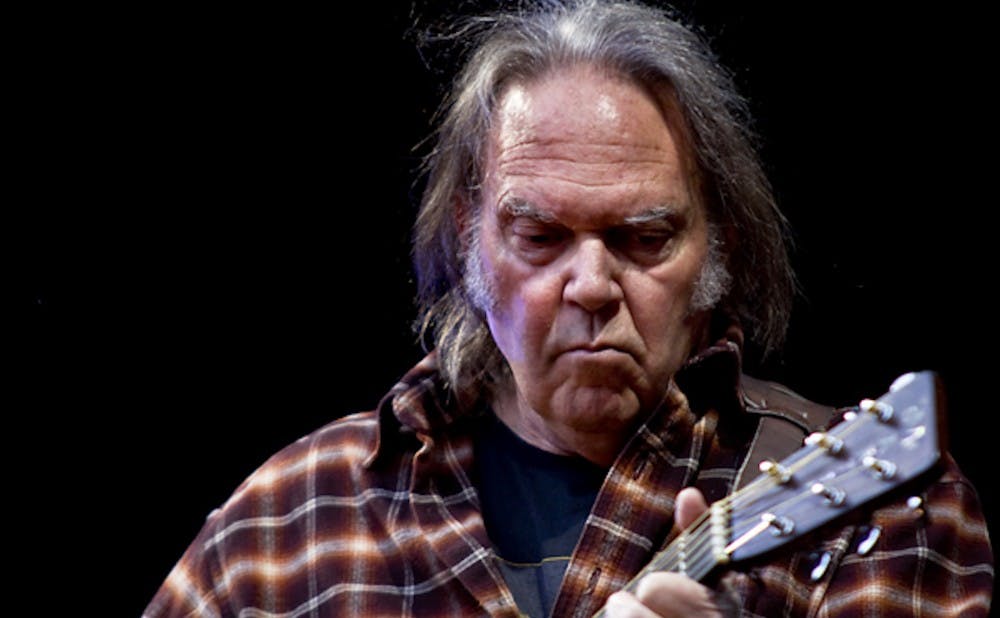Neil Young is no stranger to unreleased albums, with apocryphal knowledge of would-have-been classics like “Homegrown” and “Chrome Dreams” lurking in the back of fans’ minds and scores of demos and recordings languishing in Young’s archives.
So whenever songwriter and rock icon Young deems an album recorded 40-plus years ago worthy of release, folks sit up. Such is the case with “Hitchhiker,” a collection of ten tracks recorded in one beer- and coke-fueled blitz on Aug. 11, 1976. Featuring several altogether unreleased songs and some that appeared in alternate versions in other Young albums, the album is a strong testament to Young’s songwriting prowess. The sparse arrangements, however, of some classics pale in comparison to their dubbed or re-recorded versions and Young’s solo accompaniment is not as compelling as his work with Crazy Horse or his rotating cadre of session and touring musicians.
The album opens with two songs that would receive release on Young’s 1979 pseudo-live album “Rust Never Sleeps.” “Pocahontas” is largely unaltered, losing some of the overdub touch-ups and reverb found on “Rust Never Sleeps.” “Powderfinger,” though, is stripped to the bone—the version recorded on “Hitchhiker” loses the skyward-arcing guitar solos that buoy the Crazy Horse version and sounds like a rough demo intended to sell the song to a label. Young sounds disengaged, and the song loses the raw, ramshackle intensity that Young and Crazy Horse later brought to live renditions of the song.
Other songs on the album fail to measure up to previous Young material. Played solo with harmonica piano, “The Old Country Waltz” sounds like a trite and inauthentic send-up of “Journey Through the Past” and “ Borrowed Tune,” two classics from Young’s famed Ditch Trilogy albums. Also appearing on “Hitchhiker” is “Captain Kennedy,” which was released on 1980’s forgettable “Hawks and Doves” and makes this Young fan question why an acoustic throwaway was issued virtually unchanged on two separate records while Young epics like “Last Dance” only appear once. “Ride My Llama” also appears on “Hitchhiker,” pared down and abbreviated compared to the live version on “Rust Never Sleeps,” which incorporates some of the acoustic guitar riffs from “Captain Kennedy.”
Some songs, however, provide captivating portraits of an artist riding the last wave of his strongest, almost decade-long songwriting phase. The song “Hitchhiker” is a frank witness to the substance use that Young used to assuage his anxiety originating from constant touring and fame: “Then came paranoia / And it ran away with me / I couldn’t sign my autograph / Or appear on TV.” “Campaigner” is a searing takedown of the 1970s that echoes today, with Young laying into Richard Nixon and the role of money in the political sphere.
“Give Me Strength” is Young at his loneliest, and thus arguably his best. He pleads to some unnamed power to, predictably, give him strength, but the painstakingly pure emotion and classic Young-ian use of symbols like highway driving give the song an intimacy that supersedes any accusations of cliché.
Some of the songs that have already been released do come out stronger after receiving a solo treatment. “Human Highway,” which also appears on 1978’s “Comes a Time,” emerges successfully after being dressed down, as Young channels emotion through the song’s key line (“How could people get so unkind?”) more effectively after losing the over-produced banjo, drums and backup singer from the 1978 version. A highlight of the album, the song stands as one of Young’s late-1970s writing triumphs.
The strength of “Human Highway,” “Give Me Strength” and “Hitchhiker” do not save the rest of the album, which, without the production and arrangements of later albums, falls short of other Young classics. Some of the earnestness and energy Young evinced in albums recorded earlier in his career (“Harvest,” “After the Gold Rush”), in addition to some more compelling acoustic guitar (see the indelible steel string on the acoustic half of 1979’s “Live Rust”) would have suited the stripped-down recordings on “Hitchhiker,” as many tracks sound like a worn-out Young simply messing around. While this is hardly a bad thing, these tracks may have been more suitable as a bonus disc to a re-release of a Ditch Trilogy album—three albums similar in songwriting tone, but grander in instrumentation and energy.
Fortunately for Young, however, this album has only just now reached his listener’s ears, following several recent releases that pale in comparison to any album from his heyday. The bones of what make Young such a legendary figure are there on most of the songs, and “Hitchhiker”, while not as groundbreaking as some of his other classic albums, does nothing to diminish Young’s status as a legendary songwriter.
Get The Chronicle straight to your inbox
Signup for our weekly newsletter. Cancel at any time.

